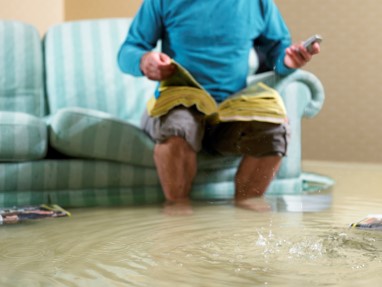|

The National Flood Insurance Program estimates that on average it costs $39,150 to repair a 2,000 square foot home with six inches of water damage. Repair costs can include cleaning fees; refinishing or replacing flooring; repairing doors, windows and trim; repairing electronic devices; and electrical and plumbing work.
There are several ways in which your home can sustain water damage. Do you know if your homeowners insurance protects you?
Burst pipe: Water damage from burst pipes is generally covered under your homeowners policy, after your deductible. However, if your insurance company believes that you were at fault or negligent in some way that caused the pipe to burst (e.g., you failed to heat your home properly and the pipes froze and burst), they may deny your claim.
Washing machine and other appliance leaks: Washing machine leaks are very common and can cause a great deal of damage. In most cases, if the leak is sudden and considered “accidental,” your homeowners policy will cover the costs of repairing the damage. However, if you are deemed to be negligent—e.g., there was an ongoing leak that you failed to fix, rather than a sudden “explosion” of the hose—your claim may be denied.
Roof leak: Your homeowners policy will cover damage to your roof and the interior of your home if the leaky roof was caused by a “covered peril”—wind, rain, hail or fire. If the leak and subsequent damage are because you have failed to properly maintain your roof, you will likely not have coverage. Your claim might also be denied if the roof damage is caused by a hurricane or flood.
Ground water seepage: Water that floods a basement or causes foundation damage is considered a maintenance issue. Most insurance companies will not cover damage due to ground water seepage.
Sewer backup: Standard homeowners insurance policies do not cover damage from sewer or drain backup, but you can add this coverage with a policy endorsement for an additional cost.
Flood from a hurricane or other weather event: Flood damage is not covered under your homeowners insurance policy.
If you live in a flood plain or want the additional protection afforded by flood insurance, you need to purchase flood insurance offered by the National Flood Insurance Program (NFIP). Congress created the National Flood Insurance Program in 1968 to help provide a way for property owners to financially protect themselves from flood damage. Flood insurance from the NFIP is available to homeowners, renters, condo owners and business owners.
In certain hurricane prone regions like much of Louisiana, you must purchase flood insurance if you have a mortgage on your home. People who live in moderate- to low-risk areas that have federally backed mortgages typically are not required to have flood insurance. However, keep in mind that people outside of high-risk areas file over 20% of NFIP claims and receive one-third of the disaster assistance allotted for flooding related disasters.
Flood insurance can only be purchased from your insurance agent, not directly from the federal government. The cost of flood insurance from the NFIP varies depending on how much insurance is purchased, what it covers, and what the flood risk of your property is.
The agents at Bromell Agency can work with you to determine the coverage options that are right for you and your property, and we can help you determine how much flood insurance coverage you need. You can also visit FloodSmart.gov to review flood maps and find out the insurance requirements for your risk area.
Also Read: Besides Checking Your Home Insurance, Critical Things To Do When Planning A Vacation
Posted Tuesday, March 04 2014 11:29 AM
Tags : insurance, homeowners insurance, coverages, louisiana, flood insurance
|